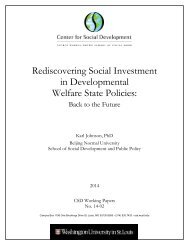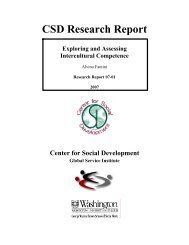Perceived Effects of International Volunteering - Center for Social ...
Perceived Effects of International Volunteering - Center for Social ...
Perceived Effects of International Volunteering - Center for Social ...
Create successful ePaper yourself
Turn your PDF publications into a flip-book with our unique Google optimized e-Paper software.
met while volunteering. They also were just as likely to report that volunteering internationally was a<br />
trans<strong>for</strong>mational – or life changing – experience, and that they were satisfied overall with the<br />
experience.<br />
The two groups <strong>of</strong> alumni diverged in their motivations, which is not surprising given that the two<br />
organizations put emphasis on different goals. The alumni also differed in their perceptions <strong>of</strong> their<br />
effectiveness as international volunteers. As <strong>for</strong> personal outcomes, they were different in terms <strong>of</strong><br />
their development <strong>of</strong> international social networks and their pursuit <strong>of</strong> particular career paths. The<br />
following discusses these findings in more detail.<br />
Volunteer motivations. Alumni from both organizations had the same top five motivations: to have a<br />
challenging or meaningful experience; to make a difference by helping others; to gain greater crosscultural<br />
understanding; to travel or live abroad; and to gain international experience and language<br />
skills. However, WorldTeach participants were more likely than CCS participants to volunteer<br />
because they needed a job; wanted to gain useful skills <strong>for</strong> school or a job; wanted to help reduce<br />
social or economic equality; planned to travel or live abroad; and desired to gain international<br />
experience and language skills.<br />
Volunteer activities and perceived effectiveness. The three primary activities implemented by volunteers from<br />
both organizations included tutoring or teaching children, youth, or adults; helping community<br />
members learn to read, speak, write, or understand the English language; and promoting crosscultural<br />
exchange. In other areas, volunteer activities from the two organizations differed<br />
considerably. More WorldTeach volunteers engaged in development-related activities, while more<br />
CCS volunteers engaged in social service related activities.<br />
Alumni rated their effectiveness highest in their respective activity areas. Compared with<br />
WorldTeach volunteers, CCS volunteers perceived they were more effective at caring <strong>for</strong> infants,<br />
children, and the elderly. WorldTeach volunteers thought they were more effective at helping<br />
community members learn to read, speak, write, or understand the English language. All volunteers<br />
perceived they were highly effective at promoting cross-cultural exchange and tutoring or teaching<br />
children, youth, and adults.<br />
Twenty-five percent (72 alumni) believed that if they had not volunteered, a local staff member<br />
would have provided these services. However, only 11 percent <strong>of</strong> those alumni thought that their<br />
services would have been provided more effectively by a local staff member. The vast majority <strong>of</strong><br />
alumni (76 percent) believed they made a lasting contribution to the host organization or<br />
community. Sixty-nine percent perceived they had a specific skill needed by the host organization,<br />
and 70 percent thought they had transferred a useful skill to the host organization. Compared to<br />
CCS, WorldTeach volunteers were more likely to agree that they contributed to the organization or<br />
host community in all three areas.<br />
Volunteer challenges. Eighteen percent <strong>of</strong> all alumni (52 volunteers) believed that their presence in the<br />
community may have caused some problems or challenges. Sixteen percent <strong>of</strong> volunteers thought<br />
that they did not share similar goals with local staff, and that they were sometimes in competition.<br />
Ten percent did not think that their activities matched local priorities, and six percent did not believe<br />
the community wanted or requested their services. CCS alumni reported language barriers and minor<br />
cultural clashes occurring between them and local staff members. WorldTeach alumni reported a<br />
C ENTER FOR S OCIAL D EVELOPMENT<br />
W ASHINGTON U NIVERSITY IN S T . L OUIS<br />
4
















